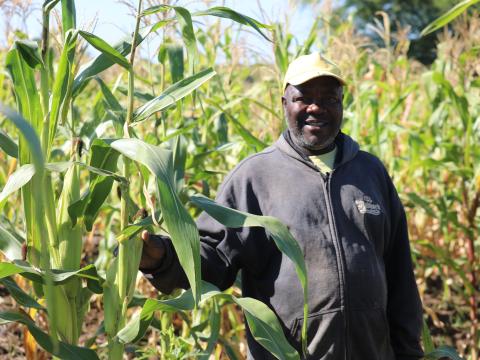How Faith Leaders in Mozambique Are Turning Belief into Sustainable Progress

By Álvaro Malamba, Communications and Advocacy Coordinator
When a crippling El Niño-induced drought swept across Mozambique’s Gaza Province, the land turned to dust. Land cracked, trees fell and survival became a daily struggle for many. Yet, in the heart of Guijá district one piece of land defied the odds.
Seven hectares of green stretched out from Pastor Américo’s farm like a dream planted in defiance of despair, thriving with maize, beans, and sweet potatoes. The quiet hum of a motor pump echoed steadily in the background, drawing lifeblood from the Limpopo River. Passersby couldn’t help but stop, stare, and ask: "How is this even possible?"
Only a few years ago, Américo himself wouldn’t have believed it. A humble village pastor, he led a small congregation and lived modestly with his family on half a hectare of dry land. They kept a few neglected cattle, made do with whatever the community could offer, and accepted scarcity as part of life. Poverty, Américo believed, was a spiritual test, a way to stay close to God.
"The river was there," he says, "but I never saw it as something I could use. I thought prosperity distracted us from the path of God."
That belief held firm, until the day it was challenged.
At a workshop hosted by World Vision, Pastor Américo encountered the concept of the "Empowered Worldview", a bold reimagining of faith and purpose. It taught that God doesn’t take pleasure in seeing His people suffer, but delights in their growth, spiritually, yes, but also economically and socially.
"It was like someone turned on a light inside me," Américo recalls. "I realised faith isn’t about waiting; it’s about stepping forward."
Spurred on by this revelation, he made a move that astonished his neighbours: he sold one of his precious cows. But instead of using the money to buy food or repair his home, he invested in a motor pump. With water from the river, his land began to breathe. Plants pushed through the soil with newfound strength, and the once barren plot came to life.
Encouraged, he sold another cow, this time for a plough and a cart. His farm grew, slowly at first, then steadily, until it became the seven hectares now celebrated as a beacon of possibility in the village.
With his growing income, Américo built a sturdy brick house, something he once considered beyond reach. He created employment for three local youths and, perhaps most profoundly, opened doors for the next generation. But for Américo, the most profound change is measured in the future he is building for his grandchildren.
With emotion in his voice, he speaks of his own children, the boys who left for South Africa to find work, the girls married off too young. It was a cycle of struggle he felt powerless to stop. Now, he funds the education of his two grandchildren, who are both in secondary school.
"I want to see them become teachers, nurses… even doctors," he says, a proud glint in his eye. "I don’t want them to inherit the same struggles."
Today, Pastor Américo still preaches at church. But his most powerful sermon isn’t spoken from the pulpit, it’s written in the soil. His farm has become a place of pilgrimage for other community members, who come not only for spiritual guidance but for practical inspiration.
His story is living proof that real transformation begins with the courage to think differently, and the faith to act on it. In a land once defined by what it lacked, Pastor Américo’s green fields now speak of something else: vision, resilience, and the quiet power of belief made real.
The Empowered Worldview (EWV) is a biblically grounded mindset-change model developed and implemented by World Vision to help individuals and communities break free from poverty by transforming the way they see themselves, their potential, and their relationship with God, others, and available resources.
In the Guijá-Mabalane district, where World Vision Mozambique implements its programmes, 30 pastors have been trained so far, including Américo, and have seen their lives transformed.